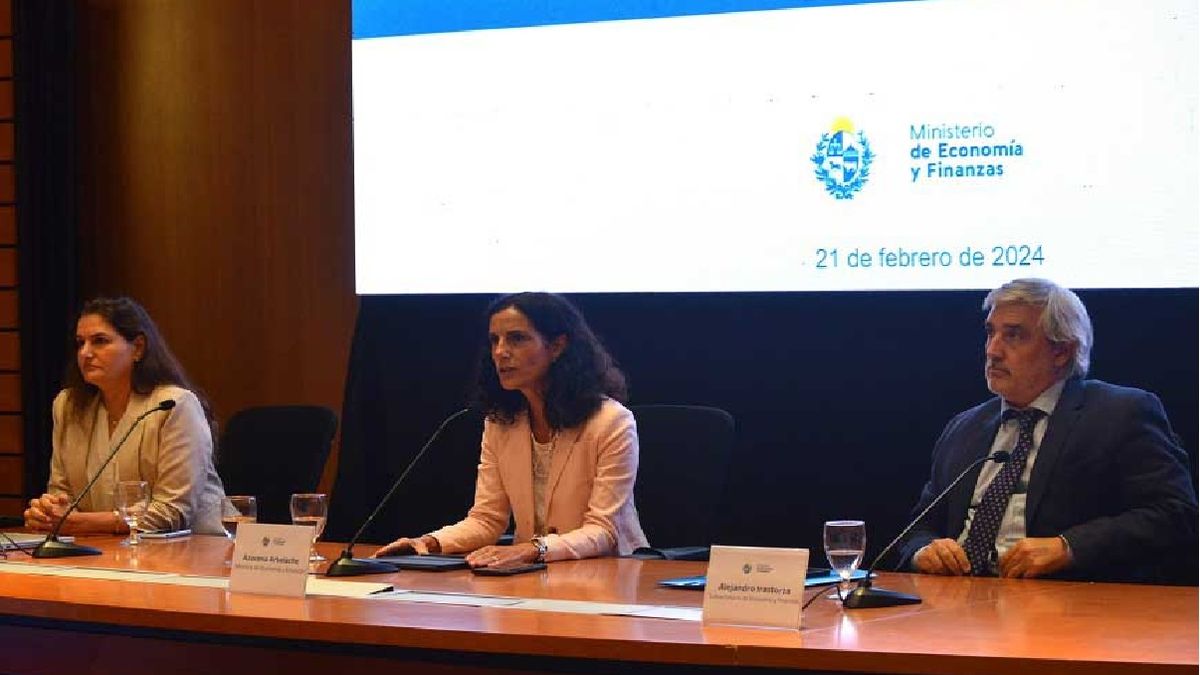Leaders of the Wide Front They criticized the presentation of the Minister of Economy and Finance (MEF), Azucena Arbelechein which he carried out the macroeconomic and fiscal balance for 2023. For the senator and pre-candidate for the presidency of Uruguay, Mario Bergara, the information was “incomplete”; while for the coordinator of the Investment Commission of the Mayor of Montevideo, Pablo Ferrarithere were issues absent in accountability.
Despite having reported relatively good news with the fulfillment of the Fiscal Rule for the fourth consecutive year, the improvement in labor and salary, and projections for this year that mark the course of moderate growth for the country – especially in relation to the meager 0.5% that it would have had in 2023 -, the presentation of Arbeleche raises criticism and questions among the opposition.
One of the first to point out errors and doubts regarding the minister’s data was Bergara, who accused the scenario presented by the head of the MEF as incomplete. “Because as is his characteristic, he chooses the variables which presents and which does not and therefore gives an incomplete image of reality,” he explained to Telemundo.
By way of argument, the senator and former president of the Central Bank of Uruguay (BCU) pointed out that Arbeleche “confirms in his presentation that there has been a noticeable deterioration in the fiscal result for a year or so, which in December was corrected a little. But all the analysts’ perspectives say that this government is going to end up with a very similar to that of 2019, which they said was catastrophic and with eight points more public debt,” he commented; and while he pointed out that some of that is derived from the Covid-19 pandemic, he also pointed out that not all of it.
“Therefore, it is insufficient when the minister emphasizes that the pillars of the fiscal rule, of her fiscal objectives, are met, this is not the case either. First of all, the fiscal goals They were changed halfway, the arc was moved halfway, the fiscal results anticipated by the rule at the beginning of the year are not being met but rather they were changed halfway to comply. It’s like moving the goal so that the ball goes in,” Bergara criticized.
Likewise, he maintained that the Uruguayan economy is “stagnant.” “We have had a year and a half stagnant economy, the second half of 2022 will have zero growth, 2023 will close very close to zero, and there will be a rebound from a growth that analysts estimate at 2%, 2-odd or 3%. Well, welcome, but it is not a wonderful result after a year and a half of stagnation,” said the Frente Amplista candidate.
Embed
The evolution of the net debt presented by the minister also reflects the aforementioned fiscal deterioration: it closed 2023 at 53.5% of GDP, when in June 23 it had been predicted that it would be at 52.2%.
This 1.3% of GDP is equivalent to an increase in net debt of 1 billion dollars.— Martín Vallcorba (@MartinVallcorba) February 21, 2024
For his part, Bergara’s economist and advisor, Martin Vallcorba, He also referred to Arbeleche’s presentation through his social networks and noted that, although he did not explicitly recognize it, “the figures presented confirm the fiscal deterioration of the last year: the GC-BPS deficit projected for 2024 increased 0.7% of GDP and the structural deficit target increased 0.6% from June 2023 to now.”
Furthermore, he pointed out that this fiscal scenario is reflected by the evolution of net debt: “2023 closed at 53.5% of GDP, when in June 2023 it had been predicted to be at 52.2%. This 1.3% of GDP is equivalent to an increase in net debt of 1 billion dollars.”
The missing themes
For his part, the coordinator of the Investment Commission of the Municipality of Montevideo, Pablo Ferreripointed out the themes absent in Arbeleche’s presentation that, in any case, are part of the day-to-day economic reality of Uruguay.
For the official, some indicators were “omitted,” and this is a sign that “there was no comprehensive view of economic policy nor an explicit long-term strategy, for example, to understand the main problem of the Uruguayan economy today, which is the low growth that our economy has been experiencing for almost a decade.”
He also noted as worrying that the concept of competitiveness: “The serious problem of exchange delay what’s wrong with it Uruguay which is the worst in the last 25 years,” said Ferreri, in dialogue with Radio Monte Carlo.
The absence of social indicators such as poverty, child poverty and inequality — “which one has to take into account when looking at the impact of economic policy” — as well as the fact that there are approximately 549,000 Uruguayans who earn less than 25,000 pesos per a full-time job, was also pointed out as worrying by the coordinator of the Montevideo Municipality.
Source: Ambito




